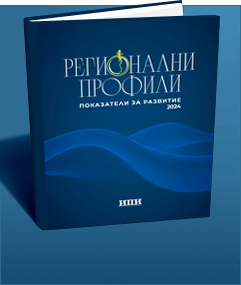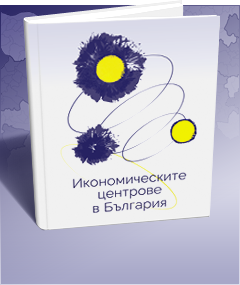We win competitions, but we struggle with math
In 2019, over 55 thousand students took their 7th grade State Matriculation Examinations (SMEs) in mathematics. The exams are mandatory at this stage in Bulgarian student’s education, hence the large figure. When disaggregated by municipality, the results of these country-wide examinations spark concern for the youth of Bulgaria. In almost every municipality in the country, grades achieved in SMEs in mathematics are far lower than those for SMEs in Bulgarian Literature; not a single municipality saw an average grade of 4.50 out of 6.00 or above in mathematics. In fact, an average grade exceeding 4.00 was not seen in all but 10 municipalities, with Sofia, Varna and Burgas barely making it above the threshold.
The decline in interest in mathematics becomes more evident in the next round of SMEs - taken after the 12th grade. At this stage in their education, students are not obligated to take an SME in mathematics, as they can instead opt to take a different subject, such as a foreign language. In 2019, almost 50 thousand students held an SME in Bulgarian literature. Out of those 50 thousand – how many do you think chose to take mathematics as their second subject? A grand total of 2255 – that is how many students bravely elected to take the mathematics examination right before their prom night. Roughly put, that is approximately 1 in 20 students. Last year across 161 municipalities, not a single 12th grade student opted to take an SME in mathematics.
A Well Prepared Few
It is worth noting that the Mathematics SMEs taken after the 12th grade attract only the best prepared students. Out of 104 municipalities with students taking the exam, 45 boasted an average grade exceeding 5.00 out of 6.00. Unlike for their 7th grade counterparts, the 12th grade Mathematics SMEs exceeded Bulgarian Literature SMEs in average grades in almost all cases. This comes as no surprise, as since the Mathematics SME is made optional, those who chose it are only those with the appropriate level of enthusiasm and ability.
The big picture is clear. When all students are put through the mathematics exam after the 7th grade, the results are greatly disappointing as the majority of students are underprepared. That changes when instead of all students, only those who actually want to take the mathematics exam – one in 20 12th graders - are put through it. This yields significantly better results. A trend worth noting is that the number of students taking the Mathematics SME after the 12th grade is declining annually, with a 200-student decrease seen only over the last year.
Now, in no way does this condemn the learning of languages, or namely the taking of language-based SMEs, as negative. On the contrary, the fact that the SME in English is the most popular elective for 12th graders is likely to reflect their tendency to want to study abroad. However, the decline in “mathematicians” – those who feel prepared and motivated to pursue mathematical disciplines belong high school – will one day hinder the economy, given that mathematics is crucial for careers in the IT and technology sector – one of the fastest growing sectors in Bulgaria. Moreover, it is within sectors such as this one that the country needs more high-performing students.
Which schools take the crown in mathematics?
The high school which, by tradition, sends the most amount of 12th graders to the Mathematics SME is the Varna’s High School for Mathematics “Dr Peter Beron”, which saw 148 students attending the exam in 2019, achieving an impressive 5.46 grade average. At the school itself, around 1,200 students receive schooling in mathematical disciplines predominantly, with current plans to realise the building of a new campus for engineering and natural sciences.
Another contender for the crown is the Sofia High School of Matehmatics “Paisyi Hilendarski”, with an average grade of a near perfect 5.80 among 141 students taking the SME in Mathematics after the 12th grade. Other notable names include the “Akademik Kiril Popov” High School of Matehmatics, with 100 examined and given a grade average of 5.37, and the High School for Exact Science and Mathematics “Akademik Nikola Obreshkov”, sending 91 students to the exams and achieving a 5.65 average grade.
The high schools with a combined focus on mathematics and exact sciences remain strong, however they gradually deviate from mathematics in favour of other disciplines. 2015 saw the number of 12th graders in high schools for Science and Mathematics taking an SME in Mathematics expectedly exceed those taking an English language exam. Such was the case with the Science and Mathematics high schools in Burgas, Blagoevgrad, Veliko Tarnovo, Vratsa, Gabrovo, Kyustendil, Haskovo and others. Conversely, in 2019, the balance was tipped in the other direction, with those taking English outnumbering the mathematicians.
In reality, there remain only about 4-5 high schools in which at least half of the students elect mathematics as one of their SME subjects.
What is the value added?
Currently, the Bulgarian economy is sending clear signals indicating a need for re-orientation towards the higher technology sector, especially towards the IT sphere and within Research and Development. Moreover, the same is seen in industries shying away from manual labour and more towards capital-intensive activities. Such a transformation requires a number of well-trained staff capable of participating in the process of technological transfer within the dynamic Bulgarian enterprises. To this end, fundamental mathematical knowledge is an integral part of this development. While linguistic knowledge is also useful, other specialist expertise is also needed.
And yet, at this stage, it appears that the Bulgarian education system fails to prepare students for this needed re-orientation, and in certain cases actually turns students off from studying exact sciences, in favour of studying humanities, economics and law instead. While those social science disciplines are still being preferred at elite institutions, the gap in IT technologies and applied sciences has become exacerbated in recent years. The ICT sector is attempting to bridge this gap in public education by creating its own academies and partnering with active educational institutions.
Unfortunately, the lack of a well-rounded educational foundation in mathematics is an obstacle in the way of such efforts. Currently, the school system places overwhelming emphasis on grammatical literacy and working with literature. It is crucial to exert the same emphasis on mathematics and natural science education. And who knows – it might have been that some of today’s lawyers and psychologists would have made better engineers or programmers, had equality in opportunities enlightened them to this path.

